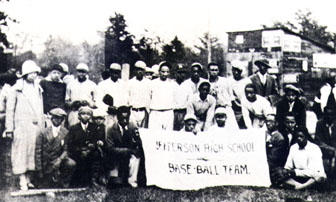| Other Features |
| Early Park Activities |
Washington Park had become an indispensable institution to the Charlottesville community by 1936, but not without growing pains. As the park began to receive heavier use, administrative and maintenance problems also arose. Much to the dismay of the park's neighbors, the swings "were proving so popular that they were being used until two or three o'clock in the morning." The condition of the park was also an ongoing concern to the community. While poison ivy and a junk car posed minor risks, there were also reports of snakes infesting the woods and a child being fatally bitten at the County Festival. Due to these circumstances, white and black Recreation Board members moved to have a chain gang clear the site. In the long run, however, civic and athletic clubs came to Washington Park's rescue.
During the late 1930's,
the Garden Club and the Colored Mothers Club undertook "a program of beautification"
at the park, while the Colored Elks agreed to sponsor an enlargement of
the baseball field. Civic clubs continued to extend their generosity to
the city as a whole and individual philanthropists remained active.
Dr. J.A. Jackson convinced the City to improve Washington Park's tennis
courts and went so far as to provide black citizens with a pool and a Boy
Scout campsite on his farm in Albemarle County.
 |
| Courtesy of the Carter G. Woodson Institute |
As Charlottesville returned to normalcy in the post-war era, little appeared to have changed in the city's recreational life. Several citizens founded a Teen-Age Club in 1946, perhaps reflecting a continued interest in the sort of activities the U.S.O. had sponsored. Despite the end of Victory Gardening, a "flower and vegetable show" occurred in Washington Park. In other respects the familiar routine resumed. Churches, social clubs and resorts continued to supplement the City's recreational offerings, while the Recreation Department still depended heavily on the generosity of black and white civic clubs.
(Source: The City as a Park: A Citizen's Guide to Charlottesville Parks. Prepared by Gregg Bleam Landscape Architects. Historian Aaron Wunsch.)
last updated 2/20/01 by Stowe Keller
 Charlottesville City Home Page
Charlottesville City Home Page